1. Cooking Outdoors Isn’t Optional

When you live in a van, your kitchen setup often shrinks to a portable stove or campfire grill. Unlike a house where you can cook inside regardless of the weather, van life makes outdoor cooking the norm more often than not. Even vans with built-in stoves usually have limited ventilation, so you’ll still find yourself cooking outside for safety and comfort. That means your “home-cooked meal” is just as exposed to wind, bugs, and rain as a typical camping dinner.
This reality often turns van cooking into car camping with extra steps because of all the gear you end up hauling out. You’re constantly moving stoves, fuel canisters, utensils, and food bins in and out of storage. Packing and unpacking your kitchen multiple times a day can wear you down, especially if you’re staying in one spot for only a night or two. It’s a ritual that looks a lot more like camping than it does like domestic living.
2. Bathrooms Are Rarely Built In
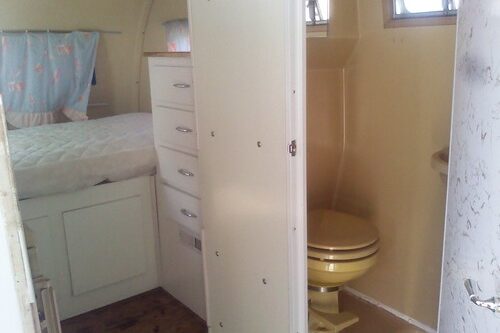
Most vans don’t have full bathrooms, unless you’re talking about expensive Class B RV conversions. Even then, the “bathroom” is usually a tiny wet bath that doubles as a closet or storage space. For many van lifers, the reality is public restrooms, gym showers, or a portable toilet tucked under a bed. This is a far cry from the convenience of a house or apartment bathroom.
Because of this, van life quickly mirrors car camping where your next bathroom stop becomes part of the travel plan. You’ll find yourself planning routes around gas stations or national park facilities. Long stretches of road demand creativity, whether it’s finding a discreet tree or using a camping shovel. The lack of consistent access makes personal hygiene feel like an ongoing project.
3. Water Is Always Limited
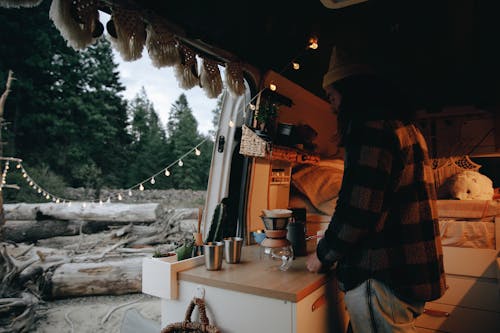
In a house, you turn on the tap and don’t think twice about how much water you’re using. In a van, water tanks usually range from 5 to 30 gallons, and once they’re empty, you’re out until you find a refill station. Washing dishes, brushing teeth, or showering all need careful rationing. Suddenly, you’re aware of every drop the same way you are when you’re camping.
This scarcity means you live with camping-style constraints all the time. Want to wash your hair? That’s half your tank gone. Doing dishes after every meal? Better grab the paper towels instead. It turns what feels like “freedom” into the constant math of balancing water storage and resupply.
4. You’re Dependent on Coolers or Tiny Fridges
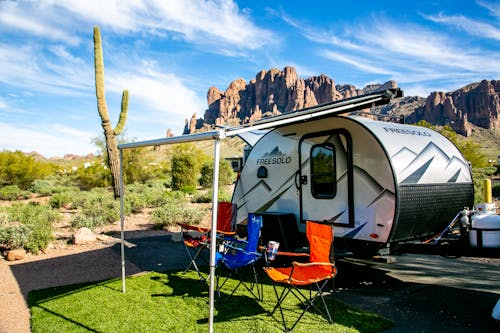
Food storage in vans usually boils down to a 12V mini fridge or an ice-filled cooler. Neither can hold much, and both require frequent maintenance. Coolers demand daily ice refills, while fridges constantly pull power from your battery system. Either way, it forces you to grocery shop far more often than you would in a traditional home.
This setup mirrors car camping where the cooler is always melting down and leaking water onto your food. It’s less about stocking up for a week and more about buying two days’ worth at a time. Even the best van setups force you into this rhythm because space and energy are limited. So “van pantry” often looks like a couple of bins filled with dry goods, just like a camping trip.
5. Every Night Is a New Campsite

At home, you sleep in the same bed every night. In a van, you’re always scoping out the next legal or safe spot to park. Apps and maps become essential tools for finding campgrounds, rest areas, or dispersed camping sites. It adds a constant layer of unpredictability to daily life.
This is where van life mirrors camping directly—you’re literally setting up camp each night, even if your “tent” has wheels. The stress of finding a place where you won’t get a knock on the door at 2 a.m. is real. Some areas welcome van lifers, while others treat them like trespassers. The result is an endless version of the “where do we sleep tonight?” problem campers know well.
6. Weather Shapes Your Day
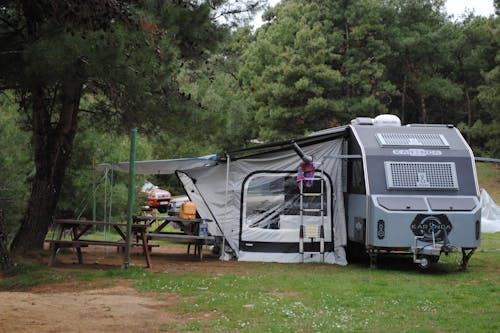
Living in a van means the weather outside is also the weather inside. Vans have poor insulation compared to houses, so cold nights bite hard and hot days turn your vehicle into an oven. Air conditioning usually only runs when the engine is on, and heaters require fuel or electricity. That means your comfort level is largely dictated by nature.
This makes van life feel like extended car camping, where weather can make or break the trip. A rainstorm might trap you inside a cramped van for hours, just like it would in a small tent. Heat waves push you toward higher elevations or shaded campgrounds. Your schedule ends up shifting around the forecast instead of your personal routine.
7. Storage Is a Constant Jigsaw Puzzle
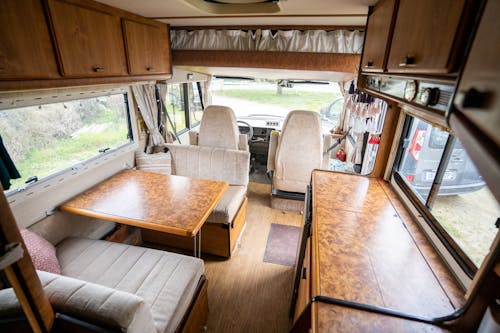
With limited square footage, every item in a van needs a designated spot. Unlike a house with closets and cabinets, vans rely on bins, drawers, and hidden compartments. The moment you buy something new, you have to ask, “Where will this go?” Organization becomes a full-time job.
This parallels car camping where your trunk and back seat are stuffed with gear bags. You’re always rearranging, unpacking, and repacking depending on what you need that day. Forget one key item at the bottom of the pile, and you’re emptying the whole van to find it. Living like this daily blurs the line between van life and permanent camping.
8. Electricity Isn’t Guaranteed
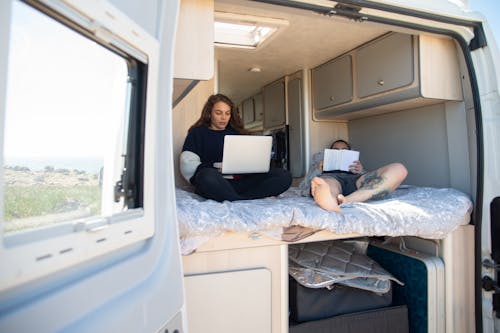
At home, charging your devices is as simple as plugging them into the wall. In a van, electricity comes from solar panels, portable batteries, or the alternator while driving. Cloudy days or long stays without driving can leave you scrambling for power. Suddenly, charging your phone becomes something you actively manage.
This limitation feels identical to camping trips where you bring along battery packs and solar chargers. You’re always calculating how much juice you have left for lights, fans, and gadgets. If you work remotely, the stakes are even higher, with Wi-Fi routers and laptops pulling energy. The “off-grid” charm quickly becomes a daily balancing act.
9. Privacy Is Thin
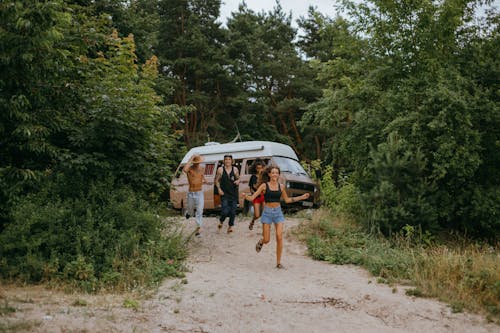
Even with curtains or window covers, living in a van means people know you’re in there. Any movement or noise carries, especially in quiet campgrounds or city streets. Unlike a home, you can’t fully retreat from public view. The awareness that someone could knock at any moment lingers in the background.
This is the same feeling campers have in tents—thin walls, no real soundproofing, and minimal personal space. You’re living life in public, whether you want to or not. Cooking, sleeping, or even changing clothes involves a degree of exposure. Privacy becomes less of a guarantee and more of a luxury.
10. Trash Disposal Becomes a Puzzle

At home, you toss your garbage in a bin and someone collects it weekly. In a van, trash piles up quickly and needs constant attention. Plastic wrappers, food scraps, and coffee grounds all accumulate in a small space. If you don’t stay on top of it, the van starts to smell fast.
This problem is familiar to anyone who’s gone car camping for a few days. You end up with bags of trash tucked under seats or dangling from trees until you can find a dumpster. Van lifers deal with this every day, making trash runs part of the lifestyle. It’s another “extra step” that turns daily living into ongoing campsite management.
11. Wildlife Is Always Nearby

When you live in a van, parking in nature means you share the space with animals. That could be raccoons snooping around, bears sniffing out food, or mice trying to sneak inside. Even in urban settings, bugs and rodents can find their way in. The line between inside and outside is thinner than most people expect.
This is exactly what campers deal with when leaving food out at a site. You learn to store everything tightly sealed and keep the van clean. One mistake can invite unwelcome critters, and solving the problem in a small space isn’t easy. Living this way keeps you in the same mindset as long-term camping.
12. Repairs Never Stop
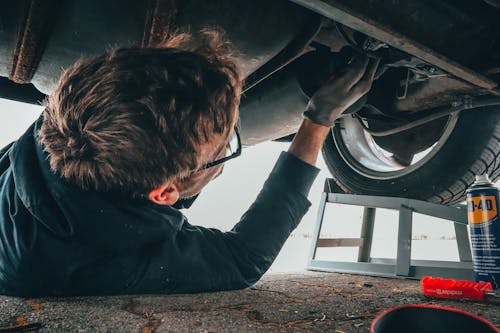
Vehicles break down, and vans are no exception. Unlike a house, your home is also your mode of transportation, so when it needs fixing, you’re stranded. Even small problems like a dead battery or flat tire can disrupt your entire lifestyle. Mechanical upkeep becomes a constant worry.
This mirrors camping trips where a car issue can cut the adventure short. The difference with van life is that it’s not a trip—it’s your every day. Every repair means juggling housing and transportation at once. It’s the ultimate reminder that van life is just car camping with bigger consequences.
This post 12 Ways Van Life Turns Into Car Camping With Extra Steps was first published on Greenhouse Black.
